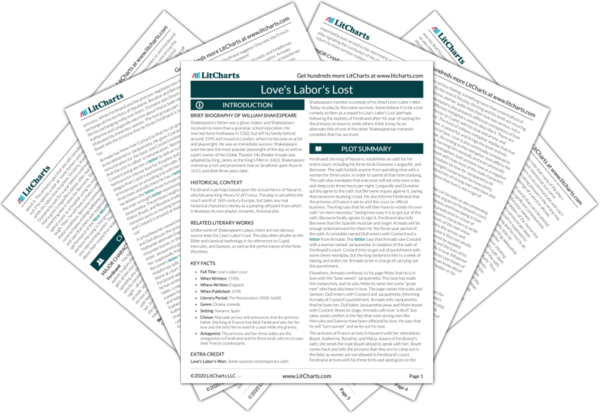Welcome to the LitCharts study guide on William Shakespeare's Love's Labor's Lost. Created by the original team behind SparkNotes, LitCharts are the world's best literature guides.
Love's...: Introduction
A concise biography of William Shakespeare plus historical and literary context for Love's Labor's Lost.
Love's...: Plot Summary
A quick-reference summary: Love's Labor's Lost on a single page.
Love's...: Detailed Summary & Analysis
In-depth summary and analysis of every scene of Love's Labor's Lost. Visual theme-tracking, too.
Love's...: Themes
Explanations, analysis, and visualizations of Love's Labor's Lost's themes.
Love's...: Quotes
Love's Labor's Lost's important quotes, sortable by theme, character, or scene.
Love's...: Characters
Description, analysis, and timelines for Love's Labor's Lost's characters.
Love's...: Symbols
Explanations of Love's Labor's Lost's symbols, and tracking of where they appear.
Love's...: Literary Devices
Love's Labor's Lost's key literary devices explained and sortable by chapter.
Love's...: Theme Wheel
An interactive data visualization of Love's Labor's Lost's plot and themes.
Brief Biography of William Shakespeare
Shakespeare's father was a glove-maker, and Shakespeare received no more than a grammar school education. He married Anne Hathaway in 1582, but left his family behind around 1590 and moved to London, where he became an actor and playwright. He was an immediate success: Shakespeare soon became the most popular playwright of the day as well as a part-owner of the Globe Theater. His theater troupe was adopted by King James as the King's Men in 1603. Shakespeare retired as a rich and prominent man to Stratford-upon-Avon in 1613, and died three years later.
Get the entire Love's... LitChart as a printable PDF.

Historical Context of Love's Labor's Lost
Ferdinand is perhaps based upon the actual Henry of Navarre, who became King Henry IV of France. The play is set within the court world of 16th century Europe, but takes any real historical characters merely as a jumping-off point from which it develops its own playful, romantic, fictional plot.
Other Books Related to Love's Labor's Lost
Unlike some of Shakespeare’s plays, there are not obvious source texts for Love’s Labor’s Lost. The play often alludes to the Bible and classical mythology in its references to Cupid, Hercules, and Samson, as well as the performance of the Nine Worthies.
Key Facts about Love's Labor's Lost
- Full Title: Love’s Labor’s Lost
- When Written: 1590s
- Where Written: England
- When Published: 1598
- Literary Period: The Renaissance (1500-1660)
- Genre: Drama, comedy
- Setting: Navarre, Spain
- Climax: Marcade arrives and announces that the princess’ father (the king of France) has died. Ferdinand asks for her love and she tells him to wait for a year while she grieves.
- Antagonist: The princess and her three ladies are the antagonists to Ferdinand and his three lords, who try to woo their French counterparts.
Extra Credit for Love's Labor's Lost
Love’s Labor’s Won. Some sources contemporary with Shakespeare mention a comedy of his titled Love’s Labor’s Won. Today, no play by this name survives. Some believe it to be a lost comedy written as a sequel to Love’s Labor’s Lost (perhaps following the exploits of Ferdinand after his year of waiting for the princess to mourn), while others think it may be an alternate title of one of the other Shakespearean romantic comedies that has survived.












